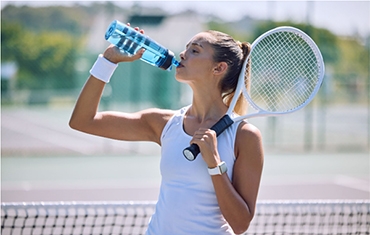
As summer temperatures rise, dehydration becomes more common—and it doesn’t just affect your energy levels. Without enough water, your joints, especially the knees and shoulders, can lose their ability to move smoothly and absorb shock. Here’s how staying hydrated supports joint health and what happens when your body runs low on this vital resource.
Why Hydration Matters for Joint Health
Water plays a critical role in maintaining the structure and function of cartilage—the smooth, rubbery tissue that cushions your joints. Cartilage is made up of nearly 70–80% water. This water allows it to absorb impact, reduce friction, and enable smooth movement. When you're dehydrated, cartilage can become less pliable and more prone to irritation, inflammation, or even wear and tear.
How Dehydration Impacts the Knees and Shoulders
During hot summer months, your body loses water faster through sweat, especially if you're physically active. If that water isn’t replenished, your joints can suffer. In the knees, dehydration may lead to increased stiffness and soreness during walking, running, or climbing stairs. In the shoulders, reduced cushioning can limit your range of motion or lead to discomfort during overhead activities.
Even mild dehydration can impact the synovial fluid that lubricates joints, making movements feel more strained and potentially increasing friction between bones.
Signs Your Joints Might Be Affected by Dehydration
While dehydration has many general symptoms like fatigue or dry mouth, your joints can show signs too. Pay attention to:
- Unusual stiffness, especially in the morning or after activity
- Clicking or grinding sounds when you move
- A sudden drop in flexibility or comfort during regular motions
- Joint fatigue during workouts, even with light effort
These symptoms may be more noticeable in hot weather and can be a sign your body—and joints—need more fluids.
Keeping Your Joints Hydrated and Healthy
To maintain optimal joint function:
- Drink water consistently throughout the day—not just when you feel thirsty
- Incorporate water-rich foods like fruits and vegetables into your meals
- Limit caffeinated and alcoholic drinks, which can contribute to dehydration
- Take breaks and hydrate during outdoor activities or exercise sessions
If joint discomfort persists despite proper hydration, underlying issues such as cartilage damage or inflammation may be the cause. Minimally invasive treatments like cartilage restoration can help relieve pain, improve function, and preserve healthy tissue.
AUTHOR: Geoffrey Van Thiel, MD, is a board-certified orthopedic surgeon specializing in sports medicine treatments of the hip, knee, and shoulder, with a focus on compassionate, cutting-edge care. Dr. Van Thiel’s commitment to athletics and an active lifestyle is evident in both his personal belief that activity leads to better health and his involvement with the Chicago Blackhawks Medical Network, AHL Rockford IceHogs, and US National Soccer Teams.





